I was pleasantly surprised by Maoyuu Maou Yuusha (“Maoyu Demon King/Hero”) (Crunchyroll). It seems much smarter and more interesting than I would have expected from the preview images or a plot summary.
A brief prolog establishes a setting that seems all to conventional. In a quasi-medieval world, war broke out 15 years ago between the lands of Humans and the lands of Demons.
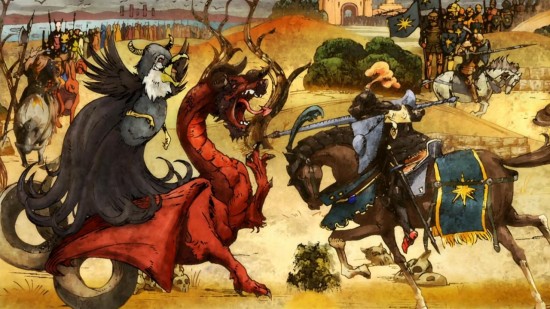
Initially there were fierce battles with victories on both sides but the war eventually settled into a stalemate with continuous low-level bloodshed.
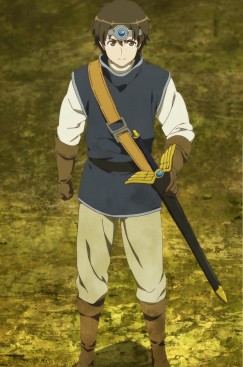
Finally a new factor appeared: a great hero, incredibly strong and brave and pure of heart, able to defeat any demon in combat.
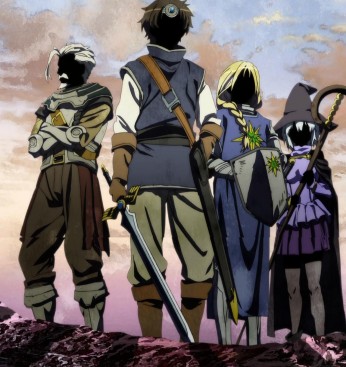
He acquired 3 faithful companions: a lecherous old archer, a noble female knight and a soft-spoken young wizard. Together they won a series of victories over the demons, penetrating deep into the Demon Lands.
Thus ends the prolog.
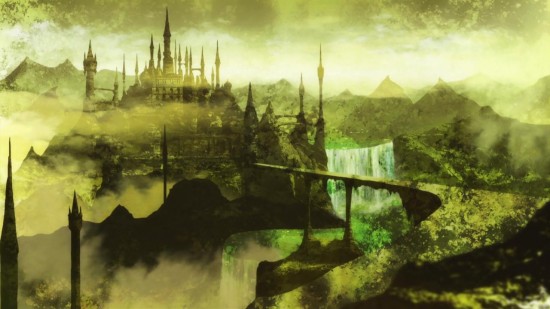
However at the beginning of the story the Hero, for reasons that he cannot himself satisfactorily explain, abandons his companions and rushes forward by himself to attack the enemy’s ultimate stronghold: the palace of the Demon King.
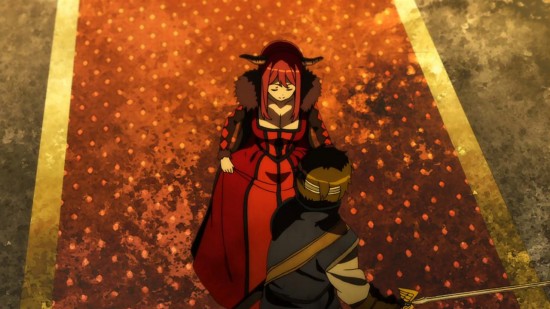
But when he gets there he is astonished to find out that the Demon King is actually an attractive young woman. (Like most Japanese titles, “ou” which means “king” or “lord,” is not gender specific.)
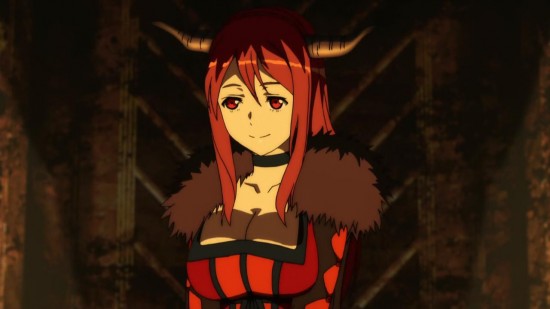
In fact she’s an extremely well-endowed young woman and the camera spends a bit too much time staring at her chest, while the Hero tries his best not to. (Well, at least it’s not a perverted dwarf cameraman.)
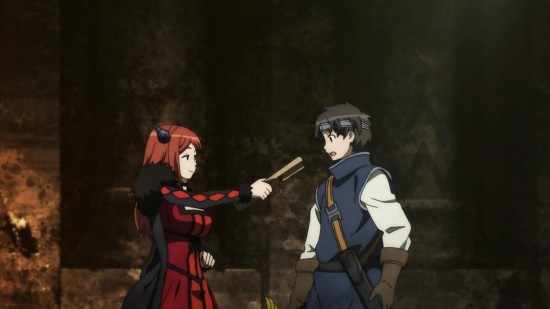
It turns out that the Demon Queen (I’m going to call her that even though Crunchyroll sticks with “Demon King”) doesn’t want to fight him. She wants to make a contract with him. In fact she wants to marry him.
The Hero is naturally suspicious but she proves her sincerity with the help of a magical device that reveals a person’s thoughts and memories.
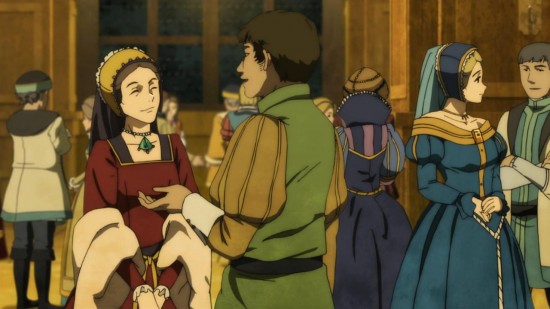
Her goal is to end the war, but that won’t be easy. Too many powerful people on both sides are profiting from it.

Of course the common people are suffering as they always do.
Her plan is remarkably subtle. They will travel around incognito and surreptitiously introduce improvements in agriculture and commerce. Presumably this will eventually help create a middle class capable of demanding peace.
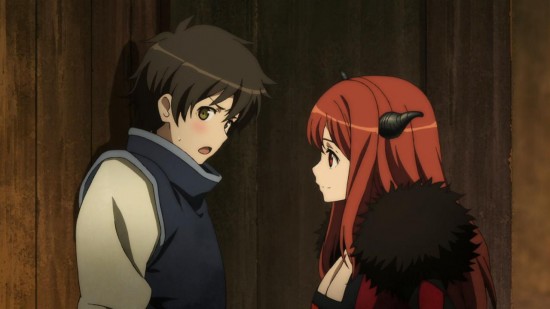
To the relief of all the Japanese boys in the audience the Demon Queen assures the Hero that she is a virgin. To her obvious disappointment he refuses to do anything about this. He’s just too pure I guess. She reluctantly accepts this for the moment but intends to keep trying.
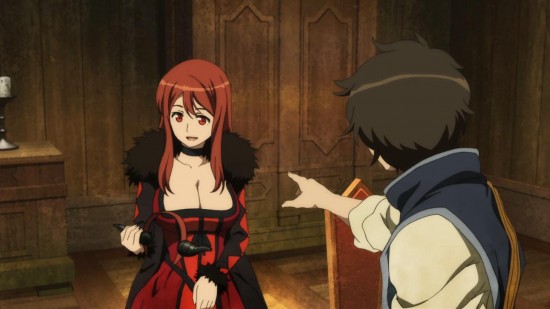
To disguise herself she takes off the hairband with the horns.
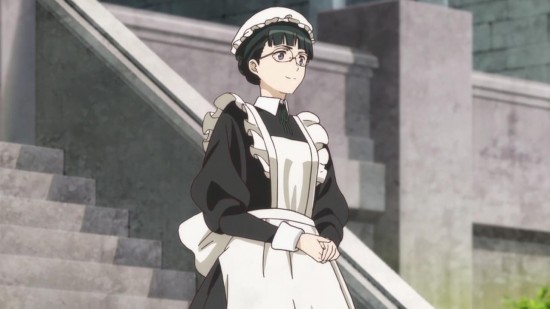
One of the few people that the Demon Queen can trust is her Chief Maid: a devoted servant, tough-minded, wise in the ways of the world, not to mention a powerful magic user and a skilled military strategist.
It seems that the “demons” look just like humans and differ from them mainly in their use of magic. Or maybe it’s just advanced technology. The Demon Queen seems to know much more about science and technology than any character in a medieval setting has a right to. Could she actually be an emissary from an advanced civilization?
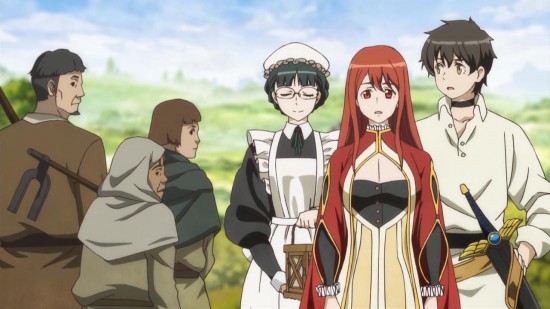
While traveling incognito the Demon Queen calls herself the “Crimson Scholar” and the Hero calls himself the “White Swordsman.” We never hear any actual names. The rule in this world seems to be that everyone is called by some sort of title. (In Japan, by contrast, elders and superiors are addressed by title while juniors and equals are addressed by name, usually with an honorific.)
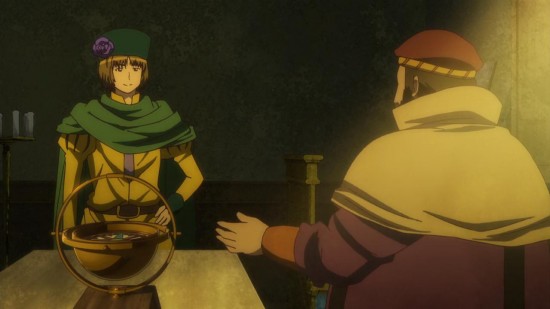 However they also seem to have an opponent: a young merchant who is an agent for the Alliance, a powerful guild determined to maintain its monopoly powers by any means necessary.
However they also seem to have an opponent: a young merchant who is an agent for the Alliance, a powerful guild determined to maintain its monopoly powers by any means necessary.
One thing I like about this series is that Mamare Touno, the author of the original light novels, seems to have done his or her homework. The innovations that the Demon Queen wants to introduce actually make a lot of sense if the goal is to quickly advance a medieval society without unnecessary bloodshed.
It’s not uncommon for a anime series to express an interest in economics but it is rare to see one that knows what it is talking about. For example, in the popular series Spice and Wolf (Hulu) the hero is a trader who travels around a medieval world. He makes some sort of complicated financial deal in every episode, but his trades never actually make any sense. That annoyed me so much that I ended up dropping the series.
Maoyu by contrast makes a lot of sense within the context of its fantasy setting. That makes it much more interesting to me and I hope they keep it up.


